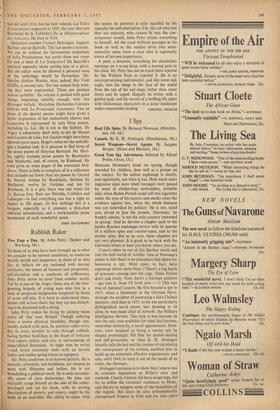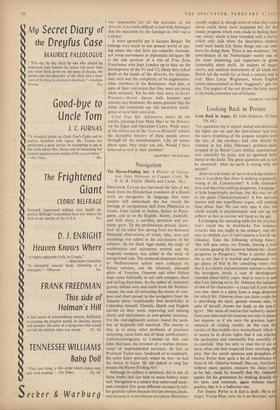I Spy
Canaris. By K. H. Abshagen. (Hutchinson, 18s.) Secret Weapons—Secret Agents. By. Jacques Bergier. (Hurst and Blackett, 18s.)
Great True Spy Adventures. Selected by Alfred Perles. (Arco, 15s.) BERNARD NEWMAN'S book on spying, though intended for children, does well as a primer on the subject. To the author espionage is clearly, and regrettably, not what it was. How much more ingenious spies were when messages were passed by word of clothes-line, embroidery, invisible inks, when Baden-Powell could roll two cigarettes under the eyes of his captors and smoke away the evidence against him, when the whole business was not bedevilled by politics! He is not, mind you, afraid to face the present. `Germany,' he frankly admits, 'is not the only country interested in spying.' And he devotes a chapter each to the jumbo Russian espionage service with its quarter of a million spies and counter-spies, and to the atomic spies. But as he says, these chapters are not very pleasant. It is good to be back with the Germans where at least you know where you are.
Canaris takes us out of this Buchan world and into the half-world of Ambler. One of Newman's points is that there is no procedure laid down for becoming a spy. Most spies, in fact, have espionage thrust upon them. ('There's a big batch of prisoners coming into the cage. These Fritzes don't talk freely. Now, here's a German uniform —get into it. Now I'll brief you—') This was true of Admiral Canaris. He first became a spy in 1915, when a lieutenant in the German Navy, through the accident of possessing a fake Chilean passport. And then in 1935, as his not particularly distinguished naval career was drawing to its close, he was made chief of Abwehr, the Military Intelligence Service. This time it was because he was the only man available for what had become, somewhat arbitrarily, a naval appointment. How- ever, once resigned to being a master spy he shaped promisingly. His flair for double-dealing and self-protection, or what K. H. Abshagen blandly calls his tact and his custom of calculating the consequence of his actions, enabled him to build up an extremely effective organisation, and also, until 1944, to keep it out of the hands of its rivals, the Gestapo.
Abshagen's purpose is to show that Canaris was in constant opposition to Hitler's aims and methods. Clearly Canaris did have misgivings, did try to stiffen the Generals' resistance to Hitler, and did try to mitigate some of the bestialities of the regime. But since he also enthusiastically championed Franco in 1936 and for nine years
was responsible for all the activities of the Abwehr, it is a little difficult to feel with Abshagen
• that his execution by the Gestapo in 1945 was a Calvary.
A more agreeable spy is Jacques Bergier. He belongs very much to our present world of spy- ing where the vital facts are scientific format, not troop movements or diplomatic intrigues. He is the sole survivor of a trio of Free Zone Frenchmen who kept London up to 'date on the development of the Vf and V2. Daily they risked death at the hands of the Abwehr, the Gestapo, and, such was the complexity of its organisation, other members of the Resistance. And that, in spite of their conviction that they were not being taken seriously. Yet he tells their story in Secret Weapons—Secret Agents with humour and scarcely any bitterness. He seems grateful that the Allies did sometimes use this hard-won intelli- gence to save their own lives.
Great True Spy Adventures unites all the worlds, running from Mata Hari to the Petrovs, via the Irgun and Operation Cicero. While many of the stories are of the 'Gott in Himmel!' school. the incredible bravery of these people comes through all the melodramatics. Like all stories about spies, they make you ask, Would I have behaved as well in their position?
GEOFFREY NICHOLSON



































 Previous page
Previous page